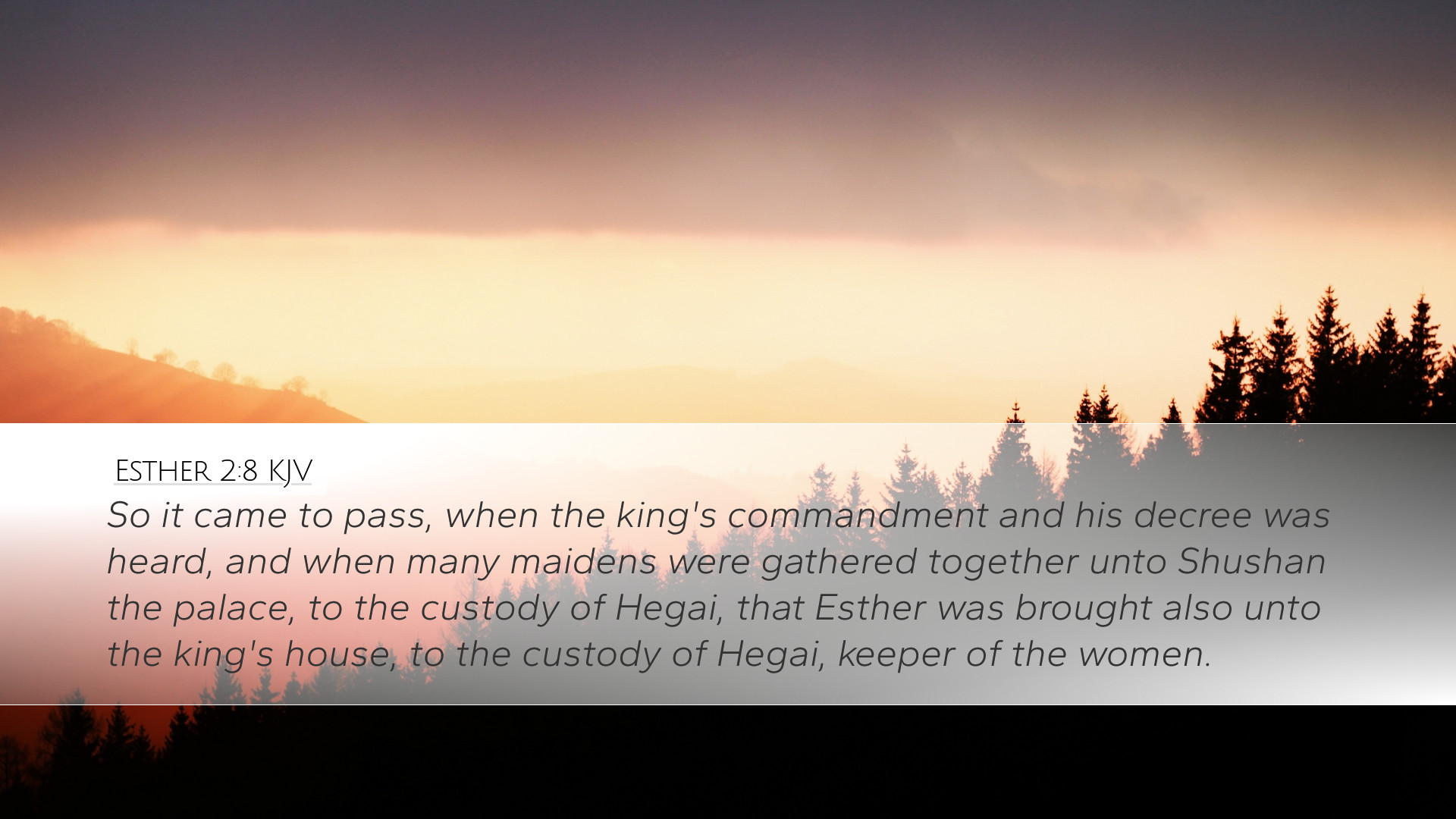Old Testament
Genesis Exodus Leviticus Numbers Deuteronomy Joshua Judges Ruth 1 Samuel 2 Samuel 1 Kings 2 Kings 1 Chronicles 2 Chronicles Ezra Nehemiah Esther Job Psalms Proverbs Ecclesiastes Song of Solomon Isaiah Jeremiah Lamentations Ezekiel Daniel Hosea Joel Amos Obadiah Jonah Micah Nahum Habakkuk Zephaniah Haggai Zechariah MalachiEsther 2:8
Esther 2:8 KJV
So it came to pass, when the king's commandment and his decree was heard, and when many maidens were gathered together unto Shushan the palace, to the custody of Hegai, that Esther was brought also unto the king's house, to the custody of Hegai, keeper of the women.
Esther 2:8 Bible Commentary
Commentary on Esther 2:8
Context Overview: The Book of Esther unfolds a narrative of divine providence in the life of the Jewish people during their exile in Persia. In Esther 2, we witness the selection of Esther as Queen, an event pivotal to the preservation of her people. This verse serves as a critical juncture that introduces Esther's story.
Verse Description
Esther 2:8 (ESV): "So when the king's order and his edict were proclaimed, and when many young women were gathered in Susa the citadel in custody of Hegai, Esther also was taken into the king's palace and put in custody of Hegai, who had charge of the women."
Commentary Insights
Historical and Cultural Context
Albert Barnes emphasizes the historical setting following the edict of King Ahasuerus, pointing out the king's desire to find a new queen after Vashti's banishment. This context is critical as it sets the stage for Esther's rise.
Matthew Henry highlights the cultural implications of gathering young women, revealing the practices of Persian royalty and the treatment of women within that society, emphasizing that their lives were heavily influenced by royal decisions.
The Selection of Esther
Esther's inclusion among the gathered women signifies divine orchestration, as noted by Adam Clarke, who notes that divine providence works in unexpected ways, leading her to be a central character in God’s plan for His people.
The Role of Hegai
Hegai, the custodian of the women, represents a pivotal character in this transition. Matthew Henry suggests that Hegai’s role may symbolize the worldly influences in Esther's life yet was a pathway leading to her inevitable destiny. However, he posits that God’s hand is evident even amidst human authority.
Albert Barnes adds that Hegai's favorable treatment of Esther may reflect God’s favor upon her, providing an essential glimpse of how God sets in motion the events necessary for the deliverance of the Jews.
Theological Implications
This verse highlights God’s providence in seemingly secular affairs. The gathering of the young women might appear arbitrary, but it serves a higher purpose. Adam Clarke elaborates that God is still in control in times of turmoil, purposefully maneuvering circumstances for His glory and the good of His people.
Matthew Henry underscores that God's providence often works quietly, unseen by those around, demonstrating that our lives are part of a larger narrative that God orchestrates for His purposes.
Personal Application for Believers
- God's Sovereignty: Believers are reminded that God's hand operates within the mundane events of life. One should always seek to see God's guidance even when situations seem ordinary.
- Preparation for Purpose: Just as Esther was being prepared for her role, so too are believers called to recognize that God prepares us for the tasks He has for us ahead.
- Faithfulness in Adversity: Esther’s story inspires faithfulness in difficult circumstances, assuring us that God is actively at work even when we are unaware.
Conclusion
Esther 2:8 invites readers to contemplate the convergence of divine providence and human actions. The insights drawn from Matthew Henry, Albert Barnes, and Adam Clarke meld together to reveal a profound theological significance in a seemingly simple verse. For pastors, students, and theologians, this serves as a reminder of God's meticulous involvement in our lives, shaping history according to His divine will.


